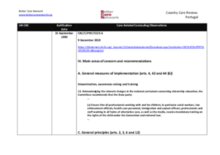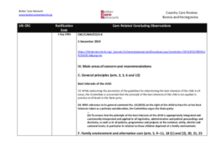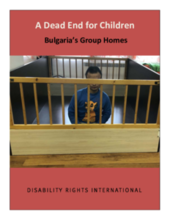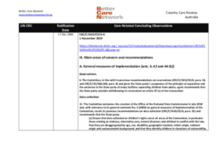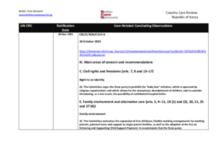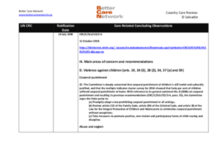Displaying 161 - 170 of 494
This country care review includes the care related Concluding Observations adopted by the Committee on the Rights of the Child and the Committee on the Rights of Persons with Disabilities.
This country care review includes the care-related Concluding Observations adopted by the Committee on the Rights of Persons with Disabilities and the Committee on the Rights of the Child.
Drawing on qualitative research undertaken with adolescents with disabilities from refugee and host communities in Jordan and the State of Palestine, this article critically interrogates the framing of child neglect, which to date has situated the state as a protector rather than a perpetrator, the narrow understanding of adolescent needs and the responsibility of international actors for ensuring that the full range of human rights of adolescents with disabilities is supported.
The main finding of this report from Disability Rights International (DRI) is that Bulgaria has replaced a system of large, old orphanages with newer, smaller buildings that are still operating as institutions.
This country care review includes the care related Concluding Observations adopted by the Committee on the Rights of Persons with Disabilities and the Committee on the Rights of the Child.
This country care review includes the care-related Concluding Observations adopted by the Committee on the Rights of Persons with Disabilities and the Committee on the Rights of the Child.
This country care review includes the care related Concluding Observations adopted by the Committee on the Rights of the Child and the Committee on the Rights of Persons with Disabilities as part of its examination of El Salvador's initial reports, as well as other care-related concluding observations, ratification dates, and links to the Universal Periodic Review and Hague Intercountry Adoption Country Profile.
This country care review includes the care related Concluding Observations adopted by the Committee on the Rights of Persons with Disabilities and the Committee on the Rights of the Child as part of their examinations of the most recent state reports.
This country care review highlights the care-related Concluding Observations from the Committee on the Rights of Persons with Disabilities.
This country care review includes the Concluding Observations for the Committee on the Rights of the Child and the Committee on the Rights of Persons with Disabilities adopted as part of the Committees' examinations of Greece’s reports, as well as other care-related concluding observations, ratification dates, and links to the Universal Periodic Review and Hague Intercountry Adoption Country Profile.

